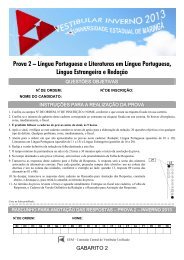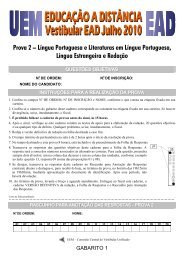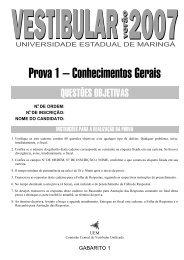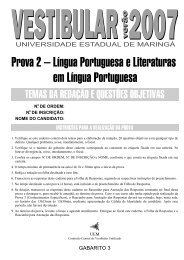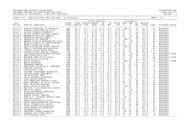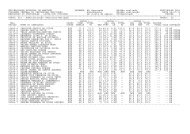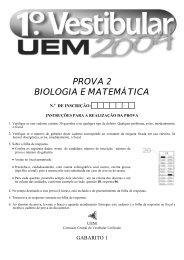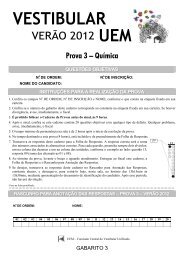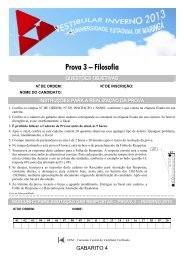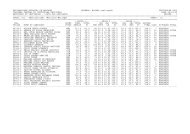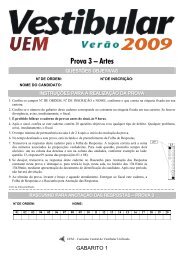UEM - Vestibular 1/2003 - Home CVU - UEM
UEM - Vestibular 1/2003 - Home CVU - UEM
UEM - Vestibular 1/2003 - Home CVU - UEM
You also want an ePaper? Increase the reach of your titles
YUMPU automatically turns print PDFs into web optimized ePapers that Google loves.
5<br />
10<br />
15<br />
20<br />
25<br />
30<br />
Texto 3<br />
RESETTING THE CLOCK<br />
Try these simple measures to minimize the<br />
effects of jet lag.<br />
Before takeoff Flying across time zones upsets the<br />
body's natural 24-hour cycle, causing the familiar<br />
phenomenon called "jet lag". The best way to limit<br />
its symptoms (fatigue, irregular digestion, etc.) is to<br />
start changing your sleep pattern five days before<br />
departure, gradually going to bed earlier if you are<br />
flying east or later if you're headed west.<br />
Up in the air Of course, by the time you read this<br />
you're probably in mid-flight. But it's not too late –<br />
there are other things you can do to combat jet lag.<br />
Get comfortable. Take off your shoes and sleep as<br />
soon as you feel tired (possibly with the help of<br />
earplugs and a sleep mask). Avoid alcohol and<br />
coffee, but drink lots of water. Take short walks in<br />
the aisles and try the exercises shown in the inflight<br />
information films.<br />
On arrival That hotel bed may look tempting, but<br />
it's best to get used to your new schedule as soon as<br />
you can. If you arrive in the morning, taking a walk<br />
outdoors is an excellent way to reset your inner<br />
clock. Sunlight regulates the secretion of melatonin,<br />
the hormone that controls our sleep cycles. The<br />
more time you spend exposed to daylight the faster<br />
you will adapt. If you arrive late in the day, it's<br />
better to go to bed. If you find it hard to fall asleep<br />
in unfamiliar surroundings, consider this: you can't<br />
bring your bedroom with you, but you can pack ...<br />
your pillow! Try it once and you'll see what a<br />
difference it can make.<br />
(Air France Madame, June 2002.)<br />
27 – Para reduzir o desconforto causado pelo jet lag, o<br />
texto 3 recomenda<br />
01) dormir mais cedo antes de qualquer viagem<br />
longa.<br />
02) ler bastante durante o vôo.<br />
04) não ficar no hotel durante muitas horas.<br />
08) assistir a filmes.<br />
16) passar algum tempo à luz do sol.<br />
32) evitar bebidas alcoólicas.<br />
64) levar objetos que lembrem seu quarto.<br />
16 <strong>UEM</strong>/<strong>CVU</strong><br />
1.º <strong>Vestibular</strong> /<strong>2003</strong> - Prova 3 GABARITO 1<br />
28 – Assinale a(s) alternativa(s) em que ocorre o modo<br />
imperativo.<br />
01) "Try these simple measures to minimize the<br />
effects of jet lag."(linhas 1 e 2)<br />
02) "... by the time you read this you're probably in<br />
mid-flight." (linhas 10 e 11)<br />
04) "Avoid alcohol and coffee, but drink lots of<br />
water." (linhas 15 e 16)<br />
08) "Take short walks in the aisles..." (linhas 16 e<br />
17)<br />
16) "That hotel bed may look tempting..." (linha 19)<br />
32) "Sunlight regulates the secretion of melatonin..."<br />
(linha 23)<br />
64) "If you find it hard to fall asleep in unfamiliar<br />
surroundings..." (linhas 27 e 28)<br />
29 – O texto 3<br />
01) ensina como regular relógios.<br />
02) alerta sobre os perigos de se viajar<br />
freqüentemente de avião.<br />
04) dá dicas de como reduzir os efeitos de um vôo<br />
longo.<br />
08) sugere medidas que podem ser tomadas durante<br />
três fases de uma viagem aérea.<br />
16) desencoraja pessoas com problemas de digestão<br />
a viajarem de avião.<br />
32) aconselha passageiros a mudarem seus hábitos<br />
de sono alguns dias antes da viagem.<br />
64) faz recomendações quanto aos melhores<br />
horários para se viajar de avião.<br />
30 – Considere as seguintes afirmações a respeito do<br />
texto 3:<br />
I - A palavra "inner" (linha 22) é um comparativo.<br />
II - "If you find it hard to fall asleep..." (linha 27)<br />
pode ser expresso como "If you have difficulty<br />
in falling asleep..." sem mudança no sentido.<br />
III - O prefixo "un-", em "unfamiliar" (linha 28),<br />
indica "excesso de".<br />
Nessas condições, é correto afirmar que<br />
01) I é verdadeira.<br />
02) II é verdadeira.<br />
04) III é verdadeira.<br />
08) I e II são verdadeiras.<br />
16) I e III são verdadeiras.<br />
32) II e III são verdadeiras.



